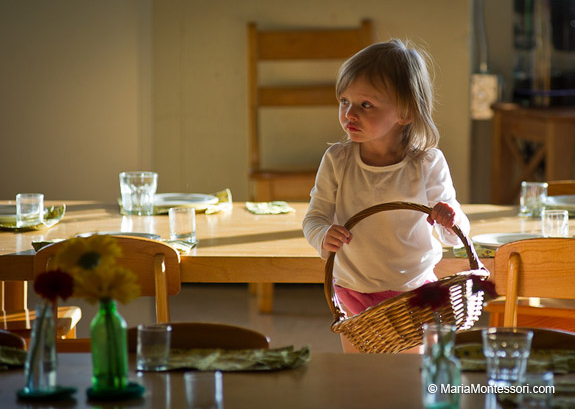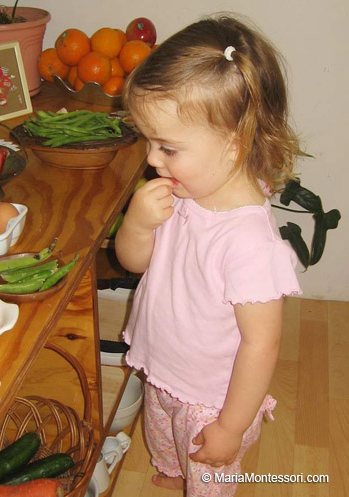
October 30, 2022
A Spontaneous Observation and Meditation
A father followed his fourteen-month-old daughter around the school library, the kitchen, and my classroom. With profound attention and absolute focus on his toddler, he gently but firmly placed his arm in her way every time she reached for something she couldn’t be allowed to touch. He said kindly but not apologetically, with conviction and patience in a very soft voice that this was someone else’s work and then he offered her work of her own. The toddler was persistent. She repeated her efforts testing out the availability of everything around all three rooms again and again. The father was persistent. He repeated his arm movement and his words again and again. He never lost focus. He never became impatient or raised his voice. He never gave up and gave in. He remained steadfastly, respectfully, and lovingly committed to his daughter’s development of impulse control.
Surely this father would have preferred having a conversation with me about the daughter he has in my class and her development. We had opened a discussion several times only to set it aside in favor of his more urgent and immediate task of attending to his toddler’s development. Never did this father roll his eyes, make a sarcastic comment, or express the slightest displeasure to me over being interrupted several times. His entire being seemed suffused with alertness and calm. It seemed that repeating as many times as necessary the words and gestures his daughter needed were to him the most ultimately meaningful and fulfilling experience.
I have seen this father in restaurants and at parties. He and his wife have taken turns for hours attending to the needs of the toddler, always with the same patience, skill, and pleasure that I observed in the father at school recently. Many questions sprang to mind immediately. How was this father capable of such a depth of understanding and such a steadfastness of practice? How does he delay gratification, exercise impulse control, and choose what’s best for his toddler’s development over what would be more enjoyable or interesting for him at the moment?
Most of us as parents have either put everything out of reach, let the child wear us down after patient attempts to intervene, kept the child away from places not prepared for him, intended to keep careful watch but become distracted or given up, lost our tempers regularly and used fear or violence to control the child, thrown up our hands in despair because we couldn’t maintain focus or intention, or decided we’d rather have fun for the moment and deal with our child later. I’ll spare myself the embarrassment of claiming my child-rearing faults. And I insist we all spare ourselves the guilt that is of no benefit to us or to our children. Instead, I propose we meditate objectively and dispassionately on the effects of our various, random, haphazard, reactive, vacillating, harsh, or self-indulgent ways of loving our children.
Since that day, I have returned again and again to wonder at the difference this father’s way of parenting can make in the lives of children. I, as a young parent, was certainly neither knowledgeable nor capable of such skill and self-discipline. I could not even have imagined it. But now, after bringing up two sets of children and working with parents and children for so many years, I have gained skills and insights, a few answers, and many, many questions.
As a part of our communal search for the roots of alienation and violence in our lives and in our society, we ask ourselves many questions.
- How does the average child feel by the age of six, having been the target of so much impatience, irritation, and annoyance?
- What does a six-year-old think about having been intimate in a relationship involving so much waffling, expediency, distraction, and inconsistency?
- Where does the average child place his trust and rest his security in the face of so much angry frustration and resentful resignation?
- At whom does a young child aim his reaction to being the cause of so much negativity, inwardly to his own soul, outwardly toward his intimates, or beyond to the Other, those strangers in strange lands?
- How can she help but forever after intertwining love (despite all, she loves her parents passionately and knows how dearly they love her) with anger, impatience, irritation, annoyance, resignation, and resentment?
- What sort of love relationship can he enjoy with friends, relatives, spouses, and children of his own?

Of course, we have all survived a childhood characterized by just such experiences during the first six years of life. And we are fine. Our communities are fine. Our country is fine. Our world is fine. Everything is fine. Or perhaps it is not. And perhaps it is time to work toward some tough changes.
Maybe love is not enough. Maybe skill and self-discipline and perseverance and skill and patience and resolve and skill and focus and concentration and skill must accompany love if we are to break the bond of alienation, depression, disorders, and violence. Maybe when violence breaks through it is just the acute case of the chronic condition that is hurting all of us all the time.
Maybe it’s time for us adults to discipline ourselves and develop another way of bringing up children, one that is neither laissez-faire nor fearsome, haphazard or oppressive, one that is authoritative, skilled, patient, persevering, and full of personal self-discipline and resolves. And we may find that the very skills that are best for bringing up children are those which will help us live together in the world as a whole.